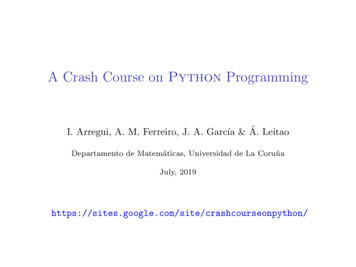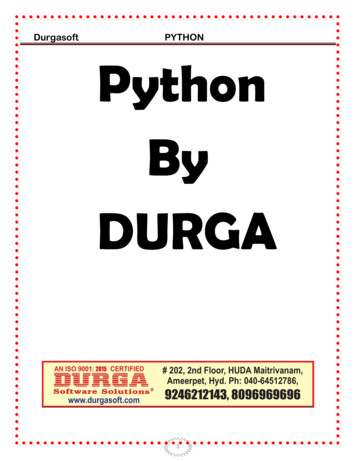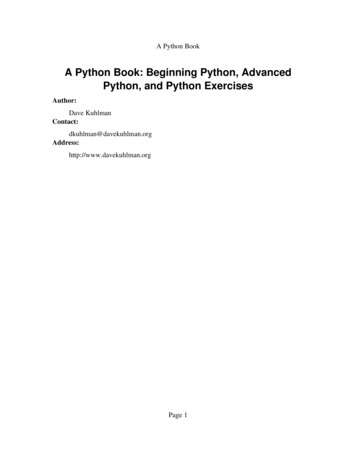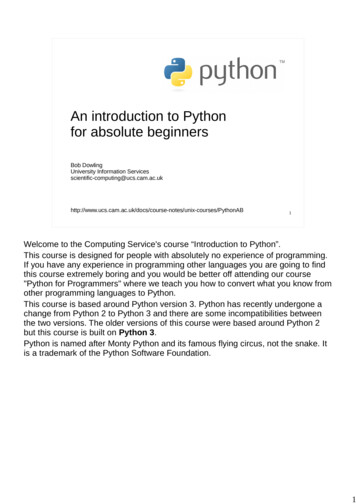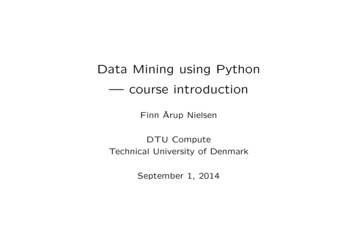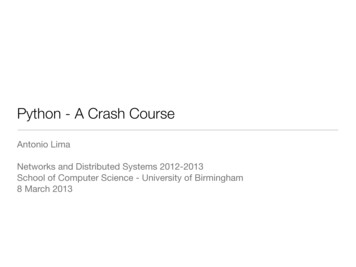
Transcription
Python - A Crash CourseAntonio LimaNetworks and Distributed Systems 2012-2013School of Computer Science - University of Birmingham8 March 2013
What is Python?Python is a an interpreted, general-purpose high-level programming languagewhose design philosophy empashises code readability."(Wikipedia) Blocks are identified by indentation (we need no stinkin’ { }, code is beautiful) CAREFUL! This means indentation is not optional, it has semantic meaning. Multiple programming paradigms: mainly object-oriented and imperative, butalso functional. You can write classes or scripts. Batteries included: most primitive structures are already implemented: lists,tuples, dictionaries, sets, . Very rich standard library (networks, json,asynchronous calls, zip files, .). If you need something but you don’t find it the standard library, chances are itis somewhere else (PyPI, GitHub, .). If not, write it yourself, it’s fun.
A Programming Language PhilosophyThe Zen of Python import thisBeautiful is better than ugly.Explicit is better than implicit.Simple is better than complex.Complex is better than complicated.Flat is better than nested.Sparse is better than dense.Readability counts.Special cases aren't special enough to break the rules.Although practicality beats purity.Errors should never pass silently.Unless explicitly silenced.In the face of ambiguity, refuse the temptation to guess.There should be one-- and preferably only one --obvious way to do it.Although that way may not be obvious at first unless you're Dutch.Now is better than never.Although never is often better than *right* now.If the implementation is hard to explain, it's a bad idea.If the implementation is easy to explain, it may be a good idea.Namespaces are one honking great idea -- let's do more of those!
Getting startedThe first thing you need to do (after installation) is launch the python interpreter. pythonPython 2.7.1 (r271:86832, Jun 16 2011, 16:59:05)[GCC 4.2.1 (Based on Apple Inc. build 5658) (LLVM build2335.15.00)] on darwinType "help", "copyright", "credits" or "license" for moreinformation.You can either use the interpreter interactively, "on the fly", or launch a script. python script foo.py
Hello world, Dynamic typing print "Hello world"Hello worldNo more forgotten ; at the end of lines.# Whatever is on the right of a hash is a comment a 3 # int a "Hello!" # string, try this in Java.You don’t need to specify types. Types are evaluated at runtime.Wonderful, huh? Not perfect, this makes runtime errors much more common.You need to be more careful with your code.
Built-in types: boolean and numeric typesa True # boolb False # boola 3 # intb 3.0 # floatc 0L # longd complex(re, im) # complex
Built-in types: lists a [1, 2, 3, 4, 5, 6] b [1, "Sam", True] # Can be non-homogeneous max(a)6 min(a)0 sum(a)21 len(a)6
List methods a.append(99) # Append an element a.remove(51) # Remove the first occurrence of 51 a.insert(10, "HI") # Insert "HI" in position 10 a.count(99) # Count the occurrences a.reverse()Explore all methods interactively using dir(a) or dir(list). You can findout what a method does by using help(a.reverse)count(.)L.count(value) - integer -- return number ofoccurrences of value
List slicing, list comprehension a range(100) a[:5] # First 5 elements a[:-5] # Last 5 elements a[:20:2] # First 5 elements, taken every three a.extend(range(100, 200)) even [el for el in a if el % 2 0]
Built-in types: strings a "I’m a string" b ‘I\’m also a string’ # Note the escape character c """I’m also a string""" # Triple quotes a[2]‘m’ fruits "Apple,Strawberry,Watermelon" fruitlist fruits.split(",")['Apple', 'Strawberry', 'Watermelon'] print ‘:‘.join(fruitlist) # Change separatorApple:Strawberry:Watermelon fruits.lower() # (or fruits.upper())"apple,strawberry,watermelon"
Built-in types: sequences a [1, 2, 3, 4] a[2] 10 a[1, 2, 10, 4]Lists are mutable, tuples are immutable. a (1, 2, 3, 4, 5, 6) a[2] 10Traceback (most recent call last):File " stdin ", line 1, in module TypeError: 'tuple' object does not support item assignment
Built-in types: setsSets are unordered collections of unique elements. Use them you want tomake sure there are no duplicates and when you don’t care about the order. a set() a.add(1) a.add(1) print aset([1]) list with repetitions [1, 2, 3, 3, 3, 2, 2, 2] set(list with repetitions) # Eliminate duplicatesset([1, 2, 3])
Built-in types: setsSets allow you to check quickly if an element is present. r range(200000) # Suppose this is a very big rs set(r) # Set of the same elements -3 in rFalse -3 in rs # This operation is much faster, O(1)False
Built-in types: dictionariesDictionaries are unordered data structures that map keys to values. users age {} users age["John"] 24 users age["Alice"] 22 users age["Alice"] 20 print users age["Alice"]20 print users age.keys()["Alice", "John"] print users age.values()[24, 22]
Interactive input name raw input("What is your name?") age raw input("What is your age?") print "You are", name, "and you are", ageYou are Mike and you are 25. print "In one year you will be", age 1Traceback (most recent call last):File " stdin ", line 1, in module TypeError: unsupported operand type(s) for : 'int' and'str' print "In one year you will be", int(age) 1In one your you will be 26.
Ifpeople set(["Alice", "John", "Laura"])users ages {# Initialize a dictionary"Alice": 20,"John": 24,"Laura": 30,}if "Alice" in people:print "Present"if "Alice" in users ages:print "Alice age is", users ages["Alice"]
ForIn python, for-loops iterate over sequences.for i in people:print iPython is about readability. Choose names wisely.for person in people:print person# Count until 100for i in range(100):print i
Whilei 0while i 20:print ii 1It works, but not very pythonic ("There should be one-- and preferably only one--obvious way to do it", readability).for i in range(20):print iThis looks better. Don’t use while for this.
WhileUse while when you are not sure of how many iterations you are going to have(for example because they depend on user input or other events).def annoying question():while answer.lower() ! "yes"print "Are you tired?"print "Then I’ll stop"
Lists vs generatorsLet’s try to count to a huge number using lists. for i in range(100000000000):.print i# Don’t try, it will hang you will have to kill the process# Any idea on why? for i in xrange(100000000000):.print i# This doesn’t hang, it evaluates next at each iteration.
Functionsdef multiply eight(n):return n*8 print multiply eight(2)16 print multiply eight("buffalo") # What do you expect?(Yes, it’s a grammatically valid sentence in American English.)
FunctionsFunctions can also be passed as a parameter.def apply function(f, sequence):for element in sequence:print f(element) apply function(multiply eight, xrange(3))0816
Classesclass Basket(object):def init (self):# Initializerself.content []def add element(self, element):self.content.append(element)b Basket() # Instantiate a new objectb.add element(3)
ModulesA module is a file containing Python definitions and statements (variables,functions, classes, .). You can reference a module from other modules in thesame directory or in the sys.path by using import. sys.path contains.import basketb basket.Basket()You can also import all items in the current namespace. However, it is notsuggested (name pollution).from basket import *b Basket()
Filesf open("foo.txt", "w ")f.write("Hello!\n")f.close()Don’t forget to close after writing. It is suggested to use the following.with open("foo.txt", "w ") as f:f.write("Hello!\n")# Closes automatically
Just the tip.
Python - A Crash Course Antonio Lima Networks and Distributed Systems 2012-2013 School of Computer Science - University of Birmingham 8 March 2013. Python is a an interpreted, general-purpose high-level programming language whose design philosophy empashises code readability. "(Wikipedia)

